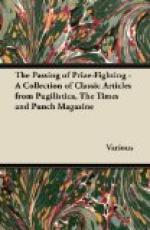who, with the girl whom he married, belonged to the
vehement circles of the Labour-Suffragist group, spending
a cheerfully ignorant life in a round of meetings,
in hunger-striking and whole-hearted support of the
pacifism that “seeks peace and ensues it by
insisting firmly, and even to blood, that it is the
other side’s duty to give way.” One
small concession you must make to Miss HAMILTON’S
plot. It is improbable that, when such a couple
as
William and
Griselda left England
in July 1914 to take their honeymoon in a remote valley
of the Belgian Ardennes, their friends, knowing them
to be without news and ignorant of all speech save
English, should have made no effort to warn them.
But, this granted, the tragedy that follows becomes
inevitable. It is so finely told and so horrible
(the more so for the deliberate restraint of the telling)
that I will say nothing to weaken its effect.
From one scene, however, I cannot withhold my tribute
of admiration—that in which
William,
alone, brokenhearted, and almost crazed with the ruin
of everything that made up his life, creeps home to
find his old associates still glibly echoing the platitudes
in which he once believed. A hint here of insincerity
or conscious arrangement would have ruined all; as
it is, the scene holds and haunts one with an impression
of absolute truth, For the end, marked like all by
an almost grim avoidance of sentimentality, I shall
only refer you to the book itself. After reading
it you will, I hope, not think me guilty of exaggeration
when I call it, slight though it is, one for which
its author has deserved well of the State.
* * * *
*
The dominant impression left upon me by Miss MERIEL
BUCHANAN’S Petrograd the City of Trouble
(COLLINS) is that its author is a sportswoman of the
first order. You see her pressing to the windows
to observe the shooting in the streets, going out
to shop, to dine, to dance, during the stormy months
of the various phases of the various Russian Revolutions.
And I hasten to add, for fear of misunderstanding,
that there is no suggestion of pose as the heroic
Englishwoman. It was not till the end of 1918
that Sir GEORGE BUCHANAN withdrew from a country in
which ambassadorial functions had obviously no reasonable
scope. But he and his family, including our chronicler,
his spirited daughter, remained long after there was
any plausible reason to hope for the restoration of
order and very long after considerations of personal
safety might well have dictated and justified retreat.
Mr. HUGH WALPOLE in his preface points out that Miss
BUCHANAN is the first English writer to give a sense
of the atmosphere of Russia during the New Terror.
It is curious, but the impression she conveys is of
something far less formidable than we have imagined.
That may well be due to her high courage which minimised
the ever-present dangers. Another odd impression
is that her accounts of current events, e.g.




